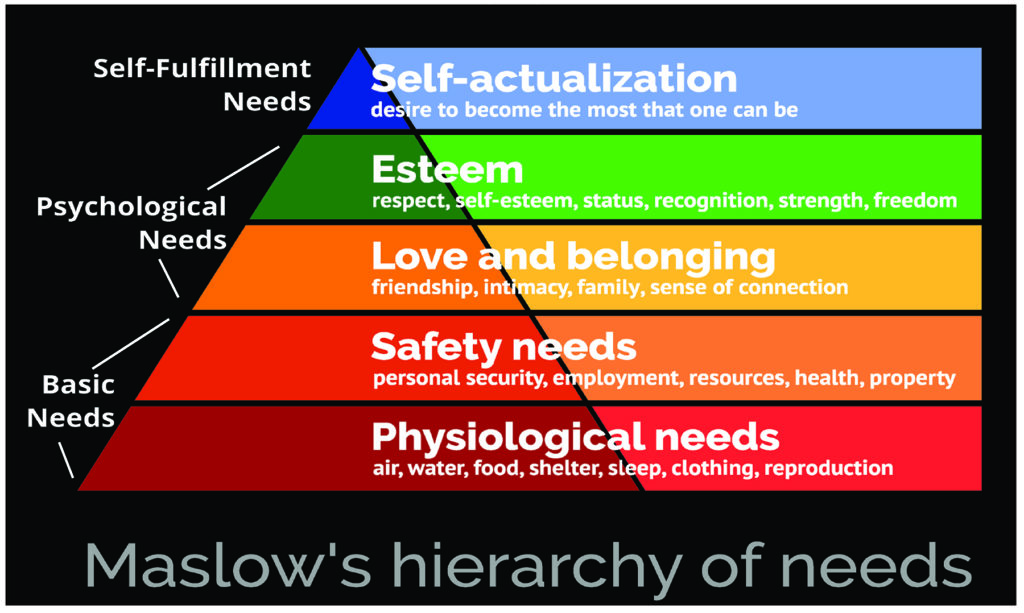Don’t Just Reopen, It’s Time to Reboot
by Andre Lawless, Lawless Marketing

Andre Lawless
In location-based entertainment, everything has changed, but it’s not “Game Over.” It’s a good time to rethink your business, and even more importantly, rethinking and rebooting may be the deciding factor in your survival.
When consumers are ready and able to emerge after months of isolation, some of their choices for entertainment will be out of business. The competition between the remaining locations will be fierce. Understanding the basics of your guests’ underlying psychology can help you know how to best communicate and anticipate how your messages will be received.
Pent up, strong emotions –– including fear and frustration related to the pandemic and economic uncertainty –– will inform what they feel comfortable doing and when.
 Noted psychologist Abraham Maslow published a 1943 paper called A Theory of Human Motivation, introducing Maslow’s Hierarchy of Needs, which is represented by a pyramid.
Noted psychologist Abraham Maslow published a 1943 paper called A Theory of Human Motivation, introducing Maslow’s Hierarchy of Needs, which is represented by a pyramid.
After people have their physiological needs met (food, water, air, sleep and shelter) they are next driven by the psychological need to be and feel safe, especially as it relates to their health and security. Once those are addressed, the next most important needs are related to their social connections (friends, family). That’s where the out-of-home amusement business comes in.
Plan Your Reopening
Operators may need to think of their return to business as a “Grand Reopening.” It may be a long time since you’ve had to think this way, but here are some questions to consider:
• What would you do if yours was a brand-new business or location?
• Would you advertise locally?
• Would you spend on Facebook ads to raise your profile and attract guests?
• Would you try to rank on Google searches for things to do in your area?
• How would you let the audience know about your offering?
• How would you stand out from your competitors?
Win Back Your Players
The advantage you have over a new business is that, ideally, you already have some loyalists, guests who have visited and have returned. As you reopen, you might have a temporary, mandated limitation on your capacity. If so, your easiest audience to communicate with will be the ones you already know. It’s a perfect time to reward them for their loyalty and encourage them to come back. You will need to remind them why they came in the first place and all of the great things you offer.
Reactivate your communication channels (email and social media):
• Tell your guests and community that you miss them. Even better, if you can record a quick video telling them how you feel, that can be social media gold.
• Tell them when you are reopening to the public.
• Communicate the operational changes you have made.
• Ask them about their favorite games to get them remembering the fun they’ve had with you.
Tell guests how you will keep them safe: Reassure them that they are safe and, if you can, make it fun and on-brand, not too clinical and frightening. Focus on safety, not illness. Good hygiene, not fear. You can see a good example from LAI Games at this link: hubs.ly/H0rn7bj0.
• Tell them how your capacity has changed (max number or percent of total occupancy)
• If you have any pre-visit booking tools, highlight those.
• Tell them what you’re doing to reinforce social distancing (show your floor decals, door signs, images and videos of staff cleaning equipment and surfaces and other things like that).
• Tell them what you expect of them in regards to wearing masks and how staff will help them when they arrive.
For operational reopening guidance related to managing including social distancing, hygiene and other issues, refer to published advice from IAAPA, AMOA, AAMA, Betson, and others.
Throw a Grand Reopening Party: Invite your previous players out and make it a “Thank You” party. Determine the new maximum capacity and work to get that number of people out for this “soft reopening”/preview before you open to the general public.
• Consider offering limited, free-play for a period of time.
• If you don’t serve food already, serve some from local vendors (you might be able to start a relationship) to show support of your community.
• Ask your vendors if they have any promotional swag to add to the mix.
• Capture the event in photos and video, then use those post-opening to show your audience how much fun was had. In the video, ask the players how they feel to be back out and playing. Use these images and videos in your post-reopening marketing.
Start spinning: Write a straightforward media alert that tells local media the “who, what, when, where and why” details about your event. Send it to local newspaper editors, TV and radio stations. Remind them what you offer and tell them what’s free. Create a sense that your location is the place to be. Or, you can write a more in-depth press release that includes a quote with your feelings about the community and how important they are to you.
Invite your community:
• Notify your chamber of commerce. They often have newsletters, websites and social media channels on which to promote your business and your events
• Notify local social groups like NextDoor.com or Patch.com. These can be great places to reach the locals
• Invite all of the local media
Take this opportunity to get on the microphone and tell your community how much you value them and what it means to you to be part of their lives. Have someone videotape the speech and repost it on social media and other communication channels.
Make yours THE place to celebrate: Invite your audience to live it up with their loved ones at your location. After months of birthdays celebrated on Zoom, people will want to eat, drink, play and celebrate life again. Highlight your location’s ability to enable those celebrations, even if the groups need to be smaller for a time. Position your location as the place to be for feeling alive again for fun, care-free birthdays, as well as team-building, especially for those that are now remote, as a way to enhance the in-person connections.
Post-Opening: Dig Deeper Into the Data & Get Emotional
• What can you learn from the play patterns of your guests?
• What are your most played games?
• What are your most profitable pieces of equipment?
• Use your play data to engage your previous guests.
Once you know what the data tells you, appeal to your guests’ underlying emotions, including joy, in order to keep them coming back and attract new players.
Speak to the emotions your entertainment offering promotes, especially how it may relate to how people are feeling now.
• If your games are social, talk to them about calling up their squad of best friends to play together and reconnect.
• If your games are physical, talk to them about getting up, moving, feeling the blood in their veins and shaking off the lethargy after months of inactivity.
• If your games are competitive, talk to them about how good it feels to go head to head and feel good about themselves when they come out on top.
• If your games are shooters, talk to them about taking out their frustrations on fantastic evil creatures.
• If you have VR, talk to them about visiting amazing virtual worlds.
Instead of the majority of your business coming in at predictably high-traffic times, you may need to look for ways to address smaller groups and drive them to visit during what have traditionally been your slower times. You may need to get fewer guests to visit across a wider swath of hours than in the past.
Give People a Deeper Reason to Believe
People connect to brands that resonate on a deeper level and represent emotions. Find out what you mean to your customers. Ask them why you matter to them. Some will tell you it’s because of your offerings, the features, the equipment, etc., but others are likely to tell you stories about how they have felt at your place. If you can capture those stories and reposition them on your communication channels, you will draw guests who think, “I want to feel and experience THAT.”
Andre Lawless is the CMO and One-Man Marketing Army at Lawless Marketing, a consulting business focused on location-based entertainment and disruptive technology. He has more than 20 years of experience with a decade in out-of-home amusement. Lawless led marketing for Ecast downloading jukeboxes and Buzztime’s networked trivia game platform and recently has executed integrated marketing for VR companies Zero Latency, Minority Media, SPREE Interactive and Entermission. He’s also worked with cashless payment companies PayRange and Tigapo. Andre has directly consulted and executed upon launch marketing plans for numerous LBE businesses and is happy to talk about how to help you reopen in a meaningful way. You can reach him at [email protected].


